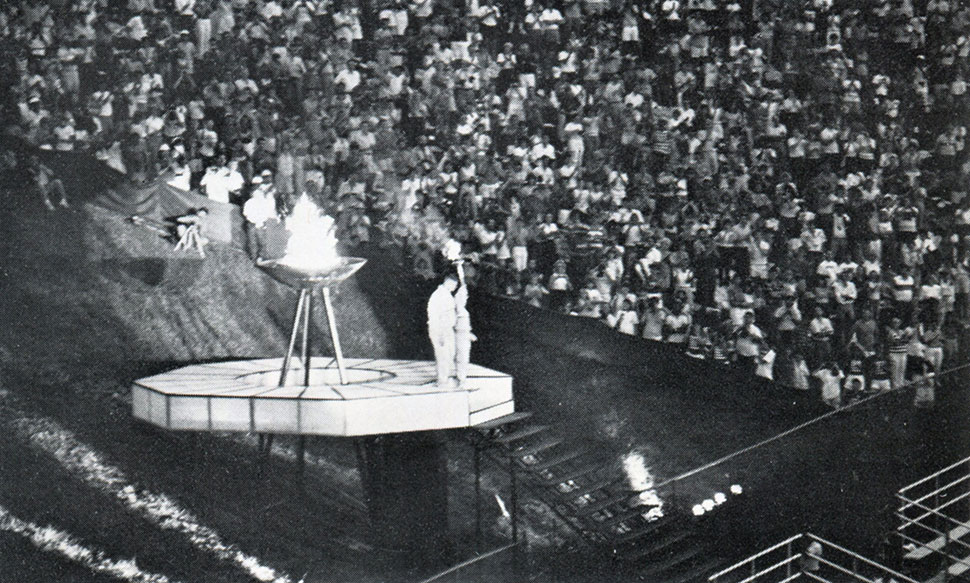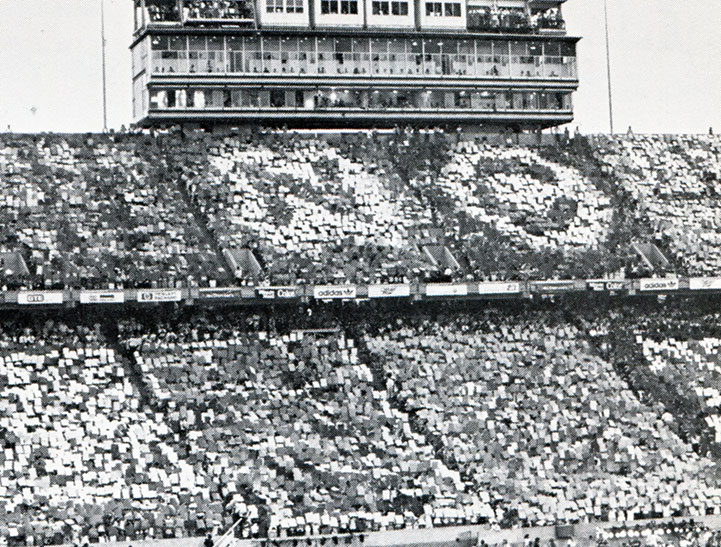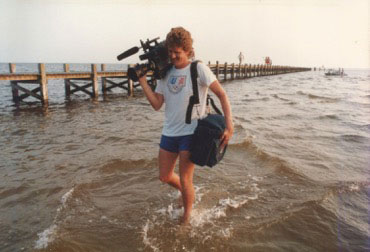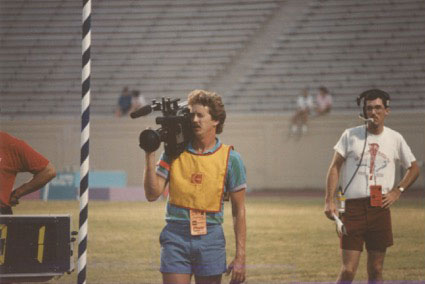
Everyone is familiar with the Olympics, summer and winter. But did you know there was an event, a warmup of sorts, for the Olympics? It was called the U.S. Olympic festival. This amateur sport spectacular started in 1978 and was originally called the National Sports Festival. It was the nation’s largest amateur sporting competition. The event was held in the years between the quadrennial Olympic games.
In 1987, The U.S. Olympic Festival was held in central North Carolina. Greensboro was the site for figure and speed skating. Durham held venues for track and field, soccer, and wrestling. Chapel Hill hosted basketball, gymnastics, and swimming. Cary was the place to be for archery. Yachting events were held at Kerr Lake. Raleigh was the site for equestrian, boxing, and diving. The great Olympian diver Greg Louganis was one of the outstanding athletes to participate in this sports spectacular.
The Festival gave athletes an excellent opportunity to sharpen their skills and for sports enthusiasts to see top tier action. It provided everything one would expect at a sporting event; “the thrill of victory and the agony of defeat,” to quote the late, great Jim McKay of ABC’s Wide World of Sports. The event had a grandiose opening ceremony complete with two torch bearers and lighting of the Festival flame. The three and a half-hour opening ceremony rivaled that of the Olympics!
 UNC basketball star J.R. Reid & UNC soccer standout April Heinrichs light the Festival flame.
UNC basketball star J.R. Reid & UNC soccer standout April Heinrichs light the Festival flame.
 Opening Ceremonies at Carter Finley Stadium
Opening Ceremonies at Carter Finley Stadium
This event did not happen overnight. Four years prior, it was a pipedream for several who wanted to bring the Festival to the local area. How does one make a pipedream come true? Call Jim Goodmon. According to the June 26, 1987 CAPCOM, even JFG had some reservations about it becoming a reality. Reluctantly he said, “Okay, we’ll get aboard. We’ll become the first Grand Patron of the U.S. Olympic Festival – ’87.”
In 1983, “Team CBC” formed to meet the challenge. Over the next few years, meetings were held in the community with Festival organizers. Logistical challenges were identified and solutions were scored. CBC staff produced radio and television promotion to raise awareness of CBC’s Grand Patronship. The company played a major role in helping the local organizing committee – North Carolina Amateur Sports – with fund raising efforts. Thirty three CBCers participated in the Torch Run too!
Coverage of the Festival began at Pikes Peak in Colorado. WRAL Sports Director Bob Holliday picks up the action in an article he wrote for the CBC History Project and for WRAL Sports Fan. Here is the link to Bob’s insightful remembrance thirty years ago:
Of course, with Jay Jennings’ involvement in an event this big, you know there will be a tall tale that falls into the category of, “you can’t make this stuff up.” Here is a collection of Jay’s Festival flashbacks 30 years later.
 WRAL Sports Duo Bob Holliday (left) and Jay Jennings
WRAL Sports Duo Bob Holliday (left) and Jay Jennings
“Our Olympic Festival journey actually started one year before. The station sent Bob and me to Houston for the ’86 games. We began that week at opening ceremonies in the Astrodome with a Beach Boys concert. From that point on, we got a taste of what our next summer would be like…a non-stop, pedal-to-the-medal, multi-sport experience. The scope of the USOF was WAY bigger than I had ever imagined.”
“After meeting the Torch Run crew in Wilmington, they told us to bring our running gear when we joined them later on the Outer Banks. Not only did Bob and I cover the event, we were part of it as well. There were several stretches along Highway 12 where no one signed up to carry the torch. That’s when Bob and I transitioned from story tellers to torch bearers. Carrying the flame along the North Carolina coast is one of the most amazing events of my career.”
“Our sunrise shoot of the torch at the Cape Hatteras Lighthouse almost never happened. After storing my camera in my air conditioned motel room overnight, it completely shut down when it hit the humid beach air outside. Lens totally fogged. Every warning light flashing. After a good bit of time under a blow dryer, my camera came back from the dead and we were good to go.”
“There’s a shot near the end of the photo-essay called ‘The Torch’ where a pair of runners in silhouette carry the flame in front of an ocean sunrise. In order to get the shot, we asked the two to move back down the dune closer to the water. Only later did I find out they were actually waist deep in the waves before they started running up the sand.”
“I was in a small boat with the torch crew as they were shuttling it between Nags Head, Manteo on Roanoke Island, and the Wright Brothers Memorial in Kill Devil Hills. About a half mile from Kill Devil Hills, our boat bottomed out in the Albemarle Sound. The next thing I know, I’m carrying my camera quite a distance through the waist deep water to the shore. I guess that was the payback for what happened back at Cape Hatteras!”
 Jay Jennings
Jay Jennings
“Seeing the Opening Ceremonies high above Carter-Finley Stadium with Frank Beall piloting SKY 5 was absolutely breathtaking. If the parade of athletes and lighting of the torch wasn’t cool enough, nobody, and I mean NOBODY had a better view of the fireworks.”
“Covering the diving venue was a real highlight. This was the one sport where the best American athletes performed and the U.S. had the best team in the world at the time. We’re talking about legends like Greg Louganis, Bruce Kimball, and Michele Mitchell. Even more amazing was how humble and accessible they were.”
“The Festival ended with track and field at Duke’s Wallace Wade Stadium. I gotta say my tank was on empty by the time we got there. The week of coverage was a marathon. All that after a month of covering the torch run and working on our special USOF show ‘Dreams of Gold.’ But we simply couldn’t mail it in. We had to finish strong. We all dug deep and found the energy for those last couple of days. And it was worth it.”
 Jay working the track and field events at Wallace Wade Stadium at Duke University.
Jay working the track and field events at Wallace Wade Stadium at Duke University.
“As the fireworks exploded overhead at the Closing Ceremonies, it was hard to believe we were done. What started for us in Houston one year ago was now over. It’s one of those moments where absolutely everything came together. The governments of the Triangle cooperating perfectly. Sports fans in the area turned out in huge numbers. But I’m most proud of the commitment and execution of CBC and WRAL-TV in telling the story of such an incredible event.”
DREAMS OF GOLD is a documentary hosted by WRAL sports anchors Tom Suiter and Bob Holliday along with several WRAL News reporters. Check out the excitement leading up to the Festival by clicking this link:
The Olympic Festival spanned the years 1978 – 1995. The ’87 Festival was truly a once in a lifetime experience.
Thanks to Corp’s Pam Allen for this capcom story & these photos. Pam Parris Allen is a former WRAL newscast producer/director who now works as a researcher and producer on the CBC History Project.